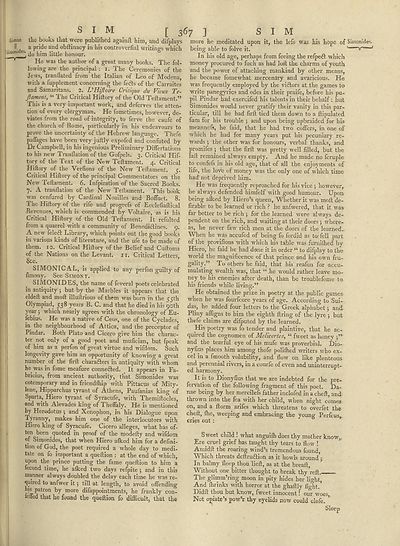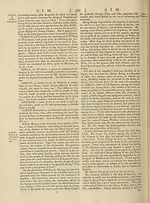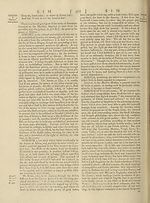Encyclopaedia Britannica, or, a Dictionary of arts, sciences, and miscellaneous literature : enlarged and improved. Illustrated with nearly six hundred engravings > Volume 19, Scripture-SUG
(411) Page 367
Download files
Complete book:
Individual page:
Thumbnail gallery: Grid view | List view

S I M
y
the books that were publifhed againft him, and difplays
a pride and obftinacy in his controverfial writings which
do him little honour.
He was the author of a great many books. The fol¬
lowing are the principal: i. The Ceremonies of the
Jews, tranflated from the Italian of Leo of Modena,
with a fupplement concerning the fefts of the Carraites
and Samaritans. 2. UHiftoire Critique du Vieux 'le¬
ft ament, “ The Critical Hiftory of the Old Teftament.”
This is a very important work, and deferves the atten¬
tion of every clergyman. He fometimes, however, de¬
viates from the road of integrity, to ferve the caufe of
the church of Rome, particularly in his endeavours to
prove the uncertainty of the Hebrew language. Thefe
palfages have been very juftly expofed and confuted by
Dr Campbell, in his ingenious Preliminary Dilfertations
to his new Tranflation of the Gofpels. 3. Critical Hif-
tory of the Text of the New Teftament. 4. Critical
Hiftory of the Verfions of the New Teftament. 5.
Critical Hiftory of the principal Commentators on the
New Teftament. 6. Infpiration of the Sacred Books.
7. A tranftation of the New Teftament. This book
was cenfured by Cardinal Noailles and Boffuet. 8.
The Hiftory of the rife and progrefs of Ecclefiaftical
Revenues, which is commended by Voltaire, as is his
Critical Hiftory of the Old Teftament. It refulted
from a quarrel with a community of Benedi&ines. 9.
A new felect Library, which points out the good books
in various kinds of literature, and the ufe to be made of
them. 10. Critical Hiftory of the Belief and Cuftoms
of the Nations on the Levant. 11. Critical Letters
&c.
SIMONICAL, is applied to any perfon guilty of
fnnony. See Simony.
SIMONIDES, the name of feveral poets celebrated
in antiquity ; but by the Marbles it appears that the
eldeft and moft illuftrious of them was born in the 55th
Olympiad, 538 years B. C. and that he died in his 90th
year; which nearly agrees with the chronology of Eu-
febius. He was a native of Ceos, one of the Cyclades,
in the neighbourhood of Attica, and the preceptor of
Pindar. Both Plato and Cicero give him the charac¬
ter not only of a good poet and mufician, but fpeak
of him as a perfon of great virtue and wifdom. Such
longevity gave him an opportunity of knowing a great
number of the firft charafters in antiquity with whom
he was in fome meafure connected. It appears in Fa-
bricius, from ancient authority, tliat Simonides was
cotemporary and in friendfttip with Pittacus of Mity-
lene, Hipparchus tyrant of Athens, Paufanias king of
Sparta, Hiero tyrant, of Syracufe, with Themiftocles,
and with Alevades king of Theffaly. He is mentioned
by Herodotus j and Xenophon, in his Dialogue upon
Tyranny, makes him one of the interlocutors with
Hiero king of Syracufe. Cicero alleges, what has of¬
ten been quoted in proof of the modefty and wifdom
of Simonides, that when Hiero alked him for a defini¬
tion of God., the poet required a whole day to medi¬
tate on fo important a queftion : at the end of Avbich,
upon the prince putting the fame queftion to him a
fecond time, he alked two days refpite j and in this
manner always doubled the delay each time he w7as re¬
quired to anfwer it j till at length, to avoid offending
ms patron by more difappointments, he frankly con-
teffed that he found the queftion fo difficult, that the
[ 367 ]
S I M
more he meditated upon it, the lefs was his hope of Simonides,
being able to folve it. —y-—j
In his old age, perhaps from feeing the refpeft which
money procured to fuch as had loft the charms of youth
and the power of attaching mankind by other means,
he became fomewhat mercenary and avaricious. He
was frequently employed by the visitors at the games to
•write panegyrics and odes in their praife, before his pu¬
pil Pindar had exercifed his talents in their behalf : but
Simonides would never gratify their vanity in this par¬
ticular, till he had firft tied them down to a ftipulated
fum for his trouble 5 and upon being upbraided for his
meannefs, he faid, that he had two coffers, in one of
which he had for many years put his pecuniary re¬
wards ; the other w'as for honours, verbal thanks, and
promifes ; that the firrt was pretty well filled, but the
laft remained always empty. And he made no fcruple
to confefs in his old age, that of all the enjoyments of
life, the love of money was the only one of which time
had not deprived him.
He was frequently reproached for his vice ; however,
he always defended himfelf with good humour. Upon
being alked by Hiero’s queen, Whether it was moft de-
firable to be learned or rich ? he anfwered, that it was
far better to be rich 5 for the learned ivere always de¬
pendent on the rich, and waiting at their doors ; where-
as, he never faw rich men at the doors of the learned.
When he was accufed of being fo fordid as to fell part
of the provifions with which his table was furniffied by
Hiero, he faid he had done it in order “ to difplay to the
world the magnificence of that prince and his own fru¬
gality.” To others he faid, that his reafon for accu¬
mulating wealth was, that “ he would rather leave mo¬
ney to his enemies after death, than be troublefome to
his friends while living.”
He obtained the prize in poetry at the public games
when he was fourfcore years of age. According to Sui-
das, he added four letters to the Greek alphabet 5 and
Pliny afligns to him the eighth firing of the lyre j but
thefe claims are difputed by the learned.
His poetry was fo tender and plaintive, that he ac¬
quired the cognomen of Melicertes, “ fweet as honey
and the tearful eye of his mufe was proverbial. Dio-
nyfms places him among thofe poliffied writers who ex¬
cel in a fmooth volubility, and flow on like plenteous
and perennial rivers, in a courfe of even and uninterrupt¬
ed harmony.
It is to Dionyfius that we are indebted for the pre-
fervation of the following fragment of this poet. Da-
nae being by her mercilefs father inclofed in a cheft, and
thrown into the fea with her child, when night comes
on, and a ftorm. arifes which threatens to overfet the
cheft, Ihe, weeping and embracing the young Perfcus,
cries out:
Sweet child ! what anguiffi does thy mother know,
Ere.cruel grief has taught thy tears to flow !
Amidft the roaring wind’s tremendous found,
Which threats deftruflion as it howls around';
In balmy fleep.thou lieft, as at the breaft,
Without one bitter thought to break thy reft.
The glimm’ring moon in pity hides her light,
And Ihrinks with horror at the ghaftly fight.
Didft thou but know, fweet innocent! our woes
Not opiate’s pow’r thy eyelids now could clofe. ’
y
the books that were publifhed againft him, and difplays
a pride and obftinacy in his controverfial writings which
do him little honour.
He was the author of a great many books. The fol¬
lowing are the principal: i. The Ceremonies of the
Jews, tranflated from the Italian of Leo of Modena,
with a fupplement concerning the fefts of the Carraites
and Samaritans. 2. UHiftoire Critique du Vieux 'le¬
ft ament, “ The Critical Hiftory of the Old Teftament.”
This is a very important work, and deferves the atten¬
tion of every clergyman. He fometimes, however, de¬
viates from the road of integrity, to ferve the caufe of
the church of Rome, particularly in his endeavours to
prove the uncertainty of the Hebrew language. Thefe
palfages have been very juftly expofed and confuted by
Dr Campbell, in his ingenious Preliminary Dilfertations
to his new Tranflation of the Gofpels. 3. Critical Hif-
tory of the Text of the New Teftament. 4. Critical
Hiftory of the Verfions of the New Teftament. 5.
Critical Hiftory of the principal Commentators on the
New Teftament. 6. Infpiration of the Sacred Books.
7. A tranftation of the New Teftament. This book
was cenfured by Cardinal Noailles and Boffuet. 8.
The Hiftory of the rife and progrefs of Ecclefiaftical
Revenues, which is commended by Voltaire, as is his
Critical Hiftory of the Old Teftament. It refulted
from a quarrel with a community of Benedi&ines. 9.
A new felect Library, which points out the good books
in various kinds of literature, and the ufe to be made of
them. 10. Critical Hiftory of the Belief and Cuftoms
of the Nations on the Levant. 11. Critical Letters
&c.
SIMONICAL, is applied to any perfon guilty of
fnnony. See Simony.
SIMONIDES, the name of feveral poets celebrated
in antiquity ; but by the Marbles it appears that the
eldeft and moft illuftrious of them was born in the 55th
Olympiad, 538 years B. C. and that he died in his 90th
year; which nearly agrees with the chronology of Eu-
febius. He was a native of Ceos, one of the Cyclades,
in the neighbourhood of Attica, and the preceptor of
Pindar. Both Plato and Cicero give him the charac¬
ter not only of a good poet and mufician, but fpeak
of him as a perfon of great virtue and wifdom. Such
longevity gave him an opportunity of knowing a great
number of the firft charafters in antiquity with whom
he was in fome meafure connected. It appears in Fa-
bricius, from ancient authority, tliat Simonides was
cotemporary and in friendfttip with Pittacus of Mity-
lene, Hipparchus tyrant of Athens, Paufanias king of
Sparta, Hiero tyrant, of Syracufe, with Themiftocles,
and with Alevades king of Theffaly. He is mentioned
by Herodotus j and Xenophon, in his Dialogue upon
Tyranny, makes him one of the interlocutors with
Hiero king of Syracufe. Cicero alleges, what has of¬
ten been quoted in proof of the modefty and wifdom
of Simonides, that when Hiero alked him for a defini¬
tion of God., the poet required a whole day to medi¬
tate on fo important a queftion : at the end of Avbich,
upon the prince putting the fame queftion to him a
fecond time, he alked two days refpite j and in this
manner always doubled the delay each time he w7as re¬
quired to anfwer it j till at length, to avoid offending
ms patron by more difappointments, he frankly con-
teffed that he found the queftion fo difficult, that the
[ 367 ]
S I M
more he meditated upon it, the lefs was his hope of Simonides,
being able to folve it. —y-—j
In his old age, perhaps from feeing the refpeft which
money procured to fuch as had loft the charms of youth
and the power of attaching mankind by other means,
he became fomewhat mercenary and avaricious. He
was frequently employed by the visitors at the games to
•write panegyrics and odes in their praife, before his pu¬
pil Pindar had exercifed his talents in their behalf : but
Simonides would never gratify their vanity in this par¬
ticular, till he had firft tied them down to a ftipulated
fum for his trouble 5 and upon being upbraided for his
meannefs, he faid, that he had two coffers, in one of
which he had for many years put his pecuniary re¬
wards ; the other w'as for honours, verbal thanks, and
promifes ; that the firrt was pretty well filled, but the
laft remained always empty. And he made no fcruple
to confefs in his old age, that of all the enjoyments of
life, the love of money was the only one of which time
had not deprived him.
He was frequently reproached for his vice ; however,
he always defended himfelf with good humour. Upon
being alked by Hiero’s queen, Whether it was moft de-
firable to be learned or rich ? he anfwered, that it was
far better to be rich 5 for the learned ivere always de¬
pendent on the rich, and waiting at their doors ; where-
as, he never faw rich men at the doors of the learned.
When he was accufed of being fo fordid as to fell part
of the provifions with which his table was furniffied by
Hiero, he faid he had done it in order “ to difplay to the
world the magnificence of that prince and his own fru¬
gality.” To others he faid, that his reafon for accu¬
mulating wealth was, that “ he would rather leave mo¬
ney to his enemies after death, than be troublefome to
his friends while living.”
He obtained the prize in poetry at the public games
when he was fourfcore years of age. According to Sui-
das, he added four letters to the Greek alphabet 5 and
Pliny afligns to him the eighth firing of the lyre j but
thefe claims are difputed by the learned.
His poetry was fo tender and plaintive, that he ac¬
quired the cognomen of Melicertes, “ fweet as honey
and the tearful eye of his mufe was proverbial. Dio-
nyfms places him among thofe poliffied writers who ex¬
cel in a fmooth volubility, and flow on like plenteous
and perennial rivers, in a courfe of even and uninterrupt¬
ed harmony.
It is to Dionyfius that we are indebted for the pre-
fervation of the following fragment of this poet. Da-
nae being by her mercilefs father inclofed in a cheft, and
thrown into the fea with her child, when night comes
on, and a ftorm. arifes which threatens to overfet the
cheft, Ihe, weeping and embracing the young Perfcus,
cries out:
Sweet child ! what anguiffi does thy mother know,
Ere.cruel grief has taught thy tears to flow !
Amidft the roaring wind’s tremendous found,
Which threats deftruflion as it howls around';
In balmy fleep.thou lieft, as at the breaft,
Without one bitter thought to break thy reft.
The glimm’ring moon in pity hides her light,
And Ihrinks with horror at the ghaftly fight.
Didft thou but know, fweet innocent! our woes
Not opiate’s pow’r thy eyelids now could clofe. ’
Set display mode to:
![]() Universal Viewer |
Universal Viewer | ![]() Mirador |
Large image | Transcription
Mirador |
Large image | Transcription
Images and transcriptions on this page, including medium image downloads, may be used under the Creative Commons Attribution 4.0 International Licence unless otherwise stated. ![]()
| Permanent URL | https://digital.nls.uk/192700625 |
|---|
| Attribution and copyright: |
|
|---|
| Description | Ten editions of 'Encyclopaedia Britannica', issued from 1768-1903, in 231 volumes. Originally issued in 100 weekly parts (3 volumes) between 1768 and 1771 by publishers: Colin Macfarquhar and Andrew Bell (Edinburgh); editor: William Smellie: engraver: Andrew Bell. Expanded editions in the 19th century featured more volumes and contributions from leading experts in their fields. Managed and published in Edinburgh up to the 9th edition (25 volumes, from 1875-1889); the 10th edition (1902-1903) re-issued the 9th edition, with 11 supplementary volumes. |
|---|---|
| Additional NLS resources: |
|

